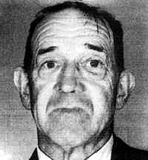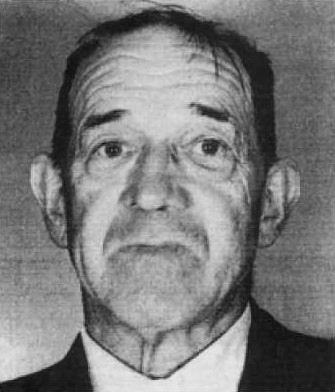Bolton was born in Wanganui, and grew
up in nearby Mangamahu. He married Beatrice Mabel Jones
in 1913, but Beatrice died on 11 July 1956 after a long
and debilitating illness. An autopsy found traces of
arsenic in body, and a police investigation was launched.
Bolton was formally charged with her murder in September.
The prosecution claimed that Bolton
was having an affair with Beatrice's sister, Florence,
who had moved in to help look after Beatrice, and that
Bolton had poisoned his wife with arsenic he possessed
for use on his farm. It also alleged that he and
Florence had destroyed Beatrice's diary. Bolton's
defence argued that Beatrice could have been poisoned
accidentally, by arsenic entering the water supply.
A jury quickly found Bolton guilty of
murdering his wife, and he was sentenced to death. He
was hanged at Mount Eden Prison in Auckland on 18
February 1957, aged 68. The death penalty was abolished
for most crimes several years later, making Bolton the
last person to be sentenced to death in New Zealand.
In recent times, there has been
speculation as to whether Bolton was guilty. His son,
James Bolton, has attempted to clear his father's name.
Sherwood Young dealt with the issue in his history of
capital punishment in New Zealand in 1998.
In January 2001, Investigate
Magazine published an article suggesting that
Florence (who committed suicide some time after the
events) was responsible for her sister's death, and that
she had also killed others. It is claimed that a note
existed in which she admitted this, but that the note
was suppressed.
Reference
The last execution in New
Zealand: Walter Bolton, 18 February 1957
Nzhistory.net.nz
Walter Bolton was the last
person to be executed in New Zealand when he was convicted of
poisoning his wife Beatrice. He was hanged for her murder at Mount
Eden prison. The death penalty for murder was abolished in New
Zealand in 1961, and there were claims that this was due partly to
the circumstances surrounding Bolton's case.
Bolton's execution raised the usual questions
about the death penalty. Some people believed that capital
punishment was legalised murder and that it was morally wrong to
take another human's life in this way. Others opposed capital
punishment on religious grounds or on the grounds that mistakes
were made.
Traces of arsenic had been found in small doses
in Beatrice's tea. The quantity consumed over the best part of a
year was enough to kill her. Water on the Bolton's farm was tested
and found to contain arsenic, and traces of arsenic were also
found in Walter and one of his daughters. The defence argued that
sheep dip had inadvertently got into the farm's water supply. The
prosecution's case was strengthened by evidence that Bolton had
admitted to having had an affair with his wife's sister, Florence.
The idea that Beatrice's death was a result of accidental
poisoning lost credibility. After deliberating for two hours and
ten minutes, the jury returned a guilty verdict. When the judge
asked Bolton why there was any reason he shouldn't pronounce the
death sentence, Walter Bolton replied, 'I plead not guilty, sir.'
A newspaper story later claimed that Bolton's
execution had gone horribly wrong. This highlighted another
concern of opponents of the death penalty – that executions were
cruel and inhumane. Rather than having his neck broken the instant
the trapdoor opened, Bolton, allegedly, slowly strangled to death.
There is, of course, no turning back after an execution if it is
subsequently proven that a person was innocent of the crime – and
there are some who still claim that Bolton was an innocent man.
What if an innocent man had been so cruelly killed on behalf of
the people of New Zealand?
Doubt over guilt left hanging
By Michelle Coursey -
NzHerald.co.nz
October 14, 2007
On February 18, 1957, at 6.30pm, Wanganui farmer
Walter James Bolton climbed the steps to the Auckland Prison gallows
and was hanged for the murder of his wife.
Bolton was the last person to receive the death
penalty in New Zealand and now new evidence has emerged that suggests
the Crown may have got it wrong.
Bolton, 68, who was known as Jim, was found guilty
of murdering his wife of 43 years, Beatrice Bolton, by poisoning her
with arsenic.
In the case, the prosecution alleged Bolton killed
Beatrice because he was in love with another woman - his sister-in-law
Florence Doughty, with whom he had a sexual affair. Lawyers for the
Crown claimed Bolton had concocted a potion of arsenic from sheep dip
and laced his wife's tea with it on several occasions, requiring
hospital treatment, before a large dose killed her on July 11, 1956.
Bolton was found guilty by an all-male jury in his
hometown of Wanganui, and lost a Court of Appeal case, despite his
claims of innocence.
But was there enough reasonable doubt in the case
for our last state-ordered death to be considered an unjustified
murder?
New evidence shows that Bolton made statements to
police at the time - which were not shared with the jury - admitting
he suffered from erectile dysfunction. This affected the relationship
he had with Doughty. He also recounted how Doughty seduced him on at
least one occasion.
A father of six, Bolton paid large sums of money
for his wife's healthcare (he even placed her in a private hospital);
and was the only member of the family to agree to an autopsy, which
then revealed Beatrice's organs were riddled with poison.
There is also the question of why Bolton persisted
with a method of murder that was not working over a period of time -
experts agree arsenic does not accumulate in the organs of the body -
and 50 years later, scientists still disagree on whether Boton would
have had the knowledge of chemistry to make the poison.
Would Bolton have been found guilty of murder
before a court today?
That is the question being posed by documentary
maker Bryan Bruce, who reveals evidence that was never heard by the
original jury on the Bolton case, in the final episode of the
television series The Investigator.
Bruce argues that the outcome might have been very
different if the jury had heard all the evidence.
"A lot of the case [in court] depended on seeing
Bolton as a sexual predator, which he didn't seem to be capable of
being. You could have argued a lot more vociferously for reasonable
doubt, if you were defending him now," Bruce says. "I think the Crown
could equally have argued that Doughty had opportunity and motive to
kill her sister."
However, this was not suggested, and a Court of
Appeal case claiming the jury could not have found him guilty based on
the evidence to hand, also failed. He was hanged less than 13 weeks
after being sentenced. His was New Zealand's last execution but it
would be another 32 years before the penalty was officially removed
from the books of law.
Ultimately, Bruce argues Bolton may have been the
victim of small-town judgement, rather than having been convicted on
the evidence to hand. "He was probably convicted as much for his
sexual morals as for whether he had killed his wife or not... I think
that Jim Bolton deserved the benefit of the doubt."
It is a case that demonstrates the dangers of the
death penalty.
Bruce says: "From time to time, when someone
commits a heinous crime in this country, kills a child perhaps, you
hear people saying bring back the death pen- alty... But the law can
get it wrong, and death is final."
Fifty-three men and one woman were executed in New
Zealand between 1842 and 1957. The death penalty was abolished in
1941, but reinstated in 1950.
The issue of state executions has been in the news
again, with Prime Minister Helen Clark announcing last week New
Zealand would support a UN initiative to abolish the death penalty
worldwide, saying "capital punishment is the ultimate form of cruel,
inhuman and degrading treatment".


